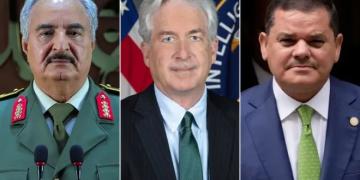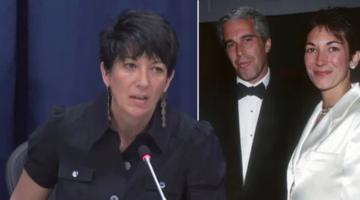Sec. of State Clinton greets Libyan stooges
There is no question that Hillary Clinton was the main culprit in the destruction of Libya. However, it was the Empire’s war, not Hillary’s. She was simply the chief instigator in the Obama regime. One can also identify the Libya aggression as a part of Obama’s Africa War, which has claimed millions of lives. Obama blames his allies and his advisors, but the Libya disaster shows the Empire – while still horribly lethal – is in a state of decay.
“More than anyone else, Hillary Clinton pushed for, and helped effectuate, the overthrow of Moammar Qaddafi.”
A ruined Libya still lives in the US politics. There’s still no escape from the country devastated by imperialist intervention. It was, as is claimed, a failure in planning. But is it a failure in planning or “something” else? The oil-rich land is now ruled by anarchy, and is actually not a single country.
Barack Obama, the US president, said, as news agencies reported, the biggest mistake of his presidency was a “lack of planning” for the aftermath of toppling and murdering Libyan leader Muammar Gaddafi, with the country descending into chaos. Asked in a Fox News interview to cite the “worst mistake” of his presidency, the US president said it was “probably failing to plan for the day after, what I think was the right thing to do, in intervening in Libya” in 2011.
It wasn’t the first time the US president admitted the failure in its intervention in the now war-ravaged country. In a recent profile in The Atlantic [1], Obama called Libya “a mess.” He blamed, partly, the European coalition led by David Cameron, the British prime minister now tarnished by Panama Papers, for not doing enough. The US leader also put blame on Nicolas Sarkozy, the former French leader now sunken in scandal. However, the US president blamed his own analysts for failing to understand the Libya reality.
There’s an opposite view also. Former Secretary of State and Democratic candidate in this year’s election Hillary Clinton cites intervention in Libya as one of her chief accomplishments when she headed the US state department. As Secretary of State, she was one of the strongest proponents of the intervention. A leading mainstream US newspaper evaluates the decision on military intervention in Libya as “arguably her moment of greatest influence as Secretary of State.”
There’s Hillary’s “famous” pronouncement: “We came, we saw, he died.” Corbett Daly’s report said: “Secretary of State Hillary Clinton shared a laugh with a television news reporter moments after hearing deposed Libyan leader Muammar Qaddafi had been killed. ‘We came, we saw, he died,’ she joked when told of news reports of Qaddafi’s death by an aide in between formal interviews.” (“Clinton on Qaddafi: ‘We came, we saw, he died,’” CBS News, October 20, 2011, also CNN, “Hillary Clinton’s real Libya Problem”, June 9, 2015)
“Obama blamed his own analysts for failing to understand the Libya reality.”
Contrasting evaluations of the intervention, one by Mr. Obama and another by Mrs. Clinton, appear. The fact, which is told, appears to be that Libyan intervention was Hillary Clinton’s war. Scott Greer refers to The Washington Post that dubbed Libya intervention as “Hillary’s war,” and adds: “She was the one who pushed President Obama to agree to enforce a no-fly-zone that allowed Gaddafi’s opposition to regroup and win the bloody 2011 civil war. She advocated for supplying weapons and military training to rebel forces, some of whom were affiliated with the Islamic militants who later assaulted the US compound in Benghazi.” Scott informs that : “Hillary was evidently proud of her work. On the day of the Benghazi attack, she emailed a staffer a note indicating she wanted…a documentary on Libya that celebrated her as a hero.” (“Remembering Libya: Hillary’s Iraq”, The Daily Caller, May 28, 2015)
The long news report by The Washington Post that Scott referred to detailed Hillary’s “pivotal role — both within a divided Cabinet and a fragile, assembled-on-the-fly international alliance” in the Libya war. The report quoted Hillary: “[W]e set into motion a policy that was on the right side of history, on the right side of our values, on the right side of our strategic interests in the region.” Citing an administration official, it said “she had become a ‘strong advocate’ for US intervention.” The Post report by Joby Warrick cited one US State Department official saying: “‘This is important to the United States, it’s important to the president, and it’s important to me personally,’ Clinton told Arab leaders.” The Washington Post report said: “Clinton, ignoring the advice of the State Department’s lawyers, convinced Obama to grant full diplomatic recognition to the rebels, a move that allowed the Libyans access to billions of dollars from Gaddafi’s frozen accounts. At a meeting in Istanbul on July 15, she pressed 30 other Western and Arab governments to make the same declaration.” (“Hillary’s war: How conviction replaced skepticism in Libya intervention,” October 30, 2011)
Paul Mirengoff terms it as “the Clinton inspired intervention”:
“More than anyone else, Hillary Clinton pushed for, and helped effectuate, the overthrow of Moammar Qaddafi.
“Clinton’s recently released Benghazi emails confirm … that, in the words of her deputy chief of staff, Hillary was ‘instrumental in securing the authorization [to intervene in Libya], building the coalition [that intervened], and tightening the noose around Qadhafi and his regime.’” (“Clinton’s Benghazi emails confirm her lack of post-intervention plan for Libya”, Powerline, May 29, 2015)
On Hillary’s leadership in the Libya intervention, John Hinderaker cites Hillary’s emails released by the US state department and writes:
“Clinton and her cohorts in NATO overthrew Qaddafi ….
“Who says Hillary Clinton is responsible for the Libya fiasco? She does. In fact, at one point she was poised to claim Libya as the notable accomplishment of her term as Secretary of State. In August 2011, Jake Sullivan, Hillary’s deputy chief of staff, wrote an email in which he summarized ‘Secretary Clinton’s leadership on Libya.’ He sent [it to] henchwoman Cheryl Mills and State Department spokeswoman Victoria Nuland, who passed it on to Hillary. Sullivan’s email begins:
[…] it shows S’ [Secretary Clinton’s] leadership/ownership/stewardship of this country’s Libya policy from start to finish.
“She advocated for supplying weapons and military training to rebel forces.”
“The email continues, with bold print in the original:
HRC has been a critical voice on Libya in administration deliberations, at NATO, and in contact group meetings – as well as the public face of the US effort in Libya. She was instrumental in securing the authorization, building the coalition, and tightening the noose around Qadhafi and his regime.
“Sullivan goes on to itemize, day by day, how Clinton drove the Libya policy not just in the US, but in NATO as well. […]
“[S]he [Hillary] bears primary responsibility for a policy that was not just a failure, but a disaster. (“Hillary’s Real Benghazi Problem”, Powerline, May 23, 2015)
“Former US defense secretary Robert Gates also describes her [Hillary Clinton] pivotal role in the decision making in his memoir. The intervention split the administration with vice president Joe Biden and national security adviser Tom Donilon against. “‘In the final phase of the internal debate, Hillary threw her considerable clout behind Rice, Rhodes and Power,’ Gates wrote.” (CNN, “Hillary Clinton’s real Libya Problem”, June 9, 2015) These have been cited in detail in “Libya War: The unknown costs and the indemnified interventionists,” (Farooque Chowdhury, Countercurrents, June 30, 2015) The interventionist drive is public.
Interventionists are not a few individuals. Their well-connected coalition is broad with political-military-business-media-academia coterie. But the questions are: Does a leader or a group of leaders prevail in the case of major decision at state/empire level? What’s the condition of the state/empire or its institutions/mechanisms/processes where one leader/politician or a group of leaders/politicians ignores assessment/analysis by those institutions, etc. while they prevail over those? Or, are there some other dynamics and relations, which empower one person or a group of persons to ignore those? Does the reality, which comes to light, signify one or a number of “diseases”?
In a state/empire plans can’t be pushed, decisions can’t be imposed by any individual, even if the individual is empire himself and the state is a monarchy. That planning/work style – individual-pressed – doesn’t bring expected output. It has been adopted on the basis of accumulated experience and handling of interests, which are not always symmetrical. Decision-making processes and institutions and organizations required for feeding the processes have been created to minimize errors and mistakes. Output is not positive whenever the arrangement is ignored.
“The interventionists were driven by business interests of a few groups.”
When is the arrangement ignored? It’s ignored either with an alternative arrangement or in case of a breakdown of the arrangement. Both signify a complicated “disease,” not healthy for any state or any empire. The two US leaders’ – Obama’s and Hillary’s – contradictory position or evaluation of the Libya disaster signal the state of what is considered an imperial power.
Many parts of the interventionists’ story are unexposed. Was there intelligence failure? Was there failure in comprehending the prevailing social reality there in Libya? Was there failure in analysis of parties involved within and outside of Libya? Was there lack of exercise with possible consequences of the intervention? The questions may or may not haunt a commission of enquiry.
Blunders and debacles wait in the wing whenever immediate interests or interests of a group overwhelm collective intelligence, whenever business interests of a group manipulate collective political wisdom, whenever an individual ignores institutional wisdom. The empire’s Libya War is such a case. The interventionists were driven by, as shown by the officially released Hillary mails, business interests of a few groups. They overwhelmed and manipulated institutional scholarship, and a political leadership failed to prevent the manipulation. The much discussed Hillary mails expose the business-intervention nexus.
It’s the empire’s Libya War – not a narrow question only related to Obama’s or Hillary’s role. The role of the individual leader, his or her wisdom and prudence depend on the state of state mechanism, and broadly a socio-economic reality; and state mechanism is an essential requirement for securing interests. A failure there, a blunder here only enhances the state’s perils, and simultaneously shows the quality of leadership the reigning interests produce/select. It’s also a fact in the case of other societies. Empire’s Libya War, one can identify it as a part of its Africa War, thus shows at least a bit of a reality, which still stands as triumphant but in decay.
Farooque Chowdhury, a Dhaka-based freelancer, has authored/edited only three (03) books in English: Micro Credit Myth Manufactured (ed.), The Age of Crisis and What Next: The Great Financial Crisis (ed.).



















